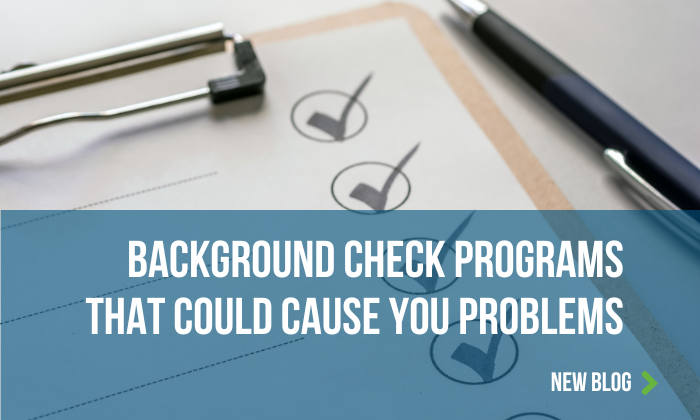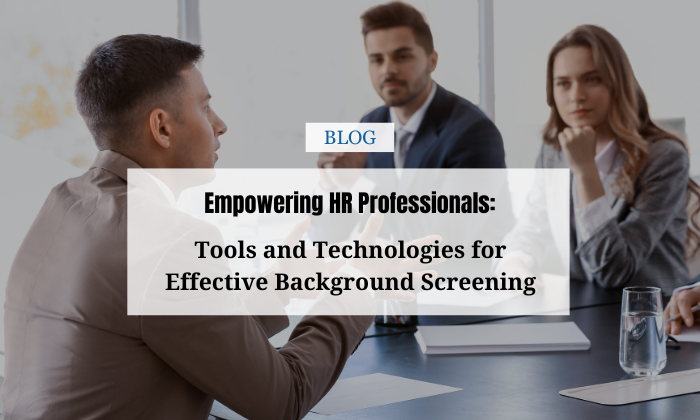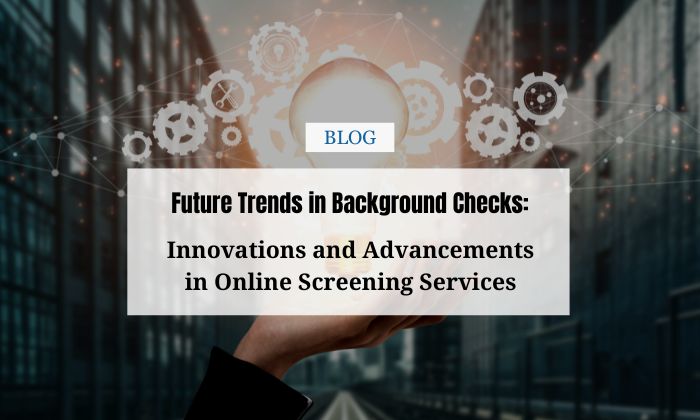In today’s fast-paced and interconnected world, where information is readily accessible and technology plays a central role in our lives, background check programs have become an omnipresent tool in decision-making processes. Employers use them to vet potential candidates, landlords employ them to assess potential tenants, non-profit organizations employ them to screen volunteers, and authorities use them to regulate firearm purchases. The underlying intention of these programs is noble – to gain valuable insights into an individual’s background and history, with the ultimate goal of ensuring safety, security, and trustworthiness within our communities.
The appeal of background checks lies in their ability to uncover critical details about an individual’s criminal record, credit history, employment background, and more. However, as these background check programs become increasingly integrated into various aspects of our lives, a darker side of their implementation emerges – the potential for problems and pitfalls that can adversely affect individuals’ lives. One of the foremost concerns is the accuracy and reliability of the information provided by these programs. Inaccurate or outdated data can lead to misjudgments, resulting in individuals being unfairly denied opportunities for employment, housing, or volunteer work.
Understanding Background Check Programs
A. Definition and Purpose of Background Checks
Background checks, also known as background screenings, are comprehensive investigations conducted by individuals, employers, organizations, or government entities to gather information about a person’s history, character, and qualifications. These checks typically involve accessing various databases, public records, and private sources to reveal details about an individual’s criminal record, employment history, credit report, education, and other relevant information.
The primary purpose of background checks is to help make informed and responsible decisions when hiring employees, renting properties, accepting volunteers, or regulating certain activities like firearms purchases. By delving into an individual’s past, these programs aim to mitigate potential risks, protect the interests of both parties involved, and ensure safety and security in various settings.
B. Types of Background Check Programs
- Pre-Employment Background Checks: In the context of employment, background checks are often conducted to assess job applicants’ suitability and qualifications for a particular role. These screenings may vary in scope depending on the nature of the job and the industry. Common elements include criminal history checks, employment verification, education verification, and reference checks.
- Tenant Screening: For landlords and property managers, tenant screening is an essential part of the leasing process. Background checks on potential tenants help assess their ability to meet financial obligations, past rental history, and any potential red flags that may affect their tenancy.
- Volunteer and Non-Profit Organization Checks: Non-profit organizations and volunteer-driven initiatives often conduct background checks on volunteers to ensure the safety of vulnerable populations they serve. These checks aim to identify any previous criminal offenses that might disqualify an individual from participating in specific volunteer activities.
- Contractor and Vendor Screenings: In the business world, companies may conduct background checks on contractors and vendors to assess their reliability, financial stability, and legal compliance. Such screenings can help protect businesses from potential risks associated with partnering with certain entities.
- Firearms Purchase Background Checks: To regulate the sale of firearms and ensure public safety, many countries require background checks for individuals seeking to purchase firearms legally. These checks typically involve scrutinizing criminal records and mental health history to prevent firearms from falling into the wrong hands.
Common Problems with Background Check Programs
While background check programs serve a vital role in safeguarding individuals, organizations, and communities, they are not without their flaws. The reliance on these screenings can lead to several common problems and challenges, which deserve careful consideration. Understanding these issues can help individuals and organizations navigate background checks more responsibly and ensure fair treatment for everyone involved. Let’s explore some of the most prevalent problems associated with background check programs:
A. Inaccurate or Outdated Information
One of the primary concerns with background checks is the potential for inaccurate or outdated information to be included in the report. These inaccuracies can stem from various sources, including administrative errors, data entry mistakes, and outdated records. False information in a background check report can have devastating consequences for individuals, leading to wrongful rejections for jobs, housing, or volunteer opportunities.
Source Data Discrepancies: Background check programs gather data from multiple sources, which might not always be consistent. Discrepancies between databases can result in conflicting information, leading to confusion during the decision-making process.
Incomplete Records: Certain databases might lack comprehensive information, which can result in an incomplete picture of an individual’s background. This incompleteness may lead to crucial details being overlooked, potentially impacting the accuracy of the screening results.
Identity Theft and Mistaken Identity: In rare cases, individuals may become victims of identity theft, where their criminal records are mistakenly attributed to someone else. This mix-up can be exceptionally distressing, tarnishing an innocent person’s reputation and causing severe repercussions.
B. Violation of Privacy Rights
Background checks delve into an individual’s personal history and can potentially infringe upon their privacy rights. While the intentions behind these screenings are generally to ensure safety and security, there is a fine line between obtaining relevant information and intruding on someone’s private life.
- Legality and Ethical Concerns: Employers and organizations must ensure that the background check process adheres to legal requirements and ethical standards. Failure to do so could result in legal repercussions, including lawsuits for privacy violations.
- Discrimination and Bias: Background checks may inadvertently contribute to discriminatory practices. Certain criteria used in the screening process, such as criminal history, could disproportionately impact individuals from specific demographics, perpetuating systemic biases.
C. Adverse Impact on Job Seekers and Individuals
The consequences of problematic background check reports can be severe for individuals. Even if the information is accurate, individuals may face challenges in correcting errors and dealing with the stigma associated with past mistakes.
- Difficulty in Correcting Errors: If inaccuracies appear in a background check report, correcting them can be a time-consuming and challenging process. This delay may result in missed opportunities for employment, housing, or volunteer work.
- Stigmatization and Reputational Damage: Individuals with past criminal records may encounter stigmatization that affects their chances of obtaining employment or finding housing, even if their offenses are not directly related to the responsibilities of the position.
- Potential Job Loss or Housing Denial: For individuals already employed or living in rented accommodations, an unexpected negative background check report could lead to job loss or eviction, even if they have been exemplary tenants or employees.
Legal and Regulatory Landscape of Background Checks
As the use of background checks becomes more prevalent across various sectors, governments and regulatory bodies have established laws and guidelines to govern their implementation. These legal frameworks aim to strike a balance between the need for safety and privacy protection, ensuring that background checks are conducted fairly and responsibly. Understanding these regulations is crucial for both individuals and organizations to navigate the background check process correctly. Here are some key aspects of the legal and regulatory landscape of background checks:
A. Overview of Relevant Laws and Regulations
- Fair Credit Reporting Act (FCRA): The FCRA is a significant federal law in the United States that governs background checks conducted by consumer reporting agencies. It sets forth guidelines on how consumer reports (background checks) should be obtained, used, and shared. The FCRA ensures that individuals have certain rights when it comes to their background information, including the right to dispute inaccurate data and receive a copy of their report.
- Equal Employment Opportunity Commission (EEOC) Guidelines: The EEOC enforces federal laws related to employment discrimination. While the EEOC does not directly regulate background checks, it has issued guidelines advising employers to use background checks carefully to avoid potential discrimination against protected classes, such as race, color, religion, sex, national origin, disability, and genetic information.
- State-Specific Regulations: In addition to federal laws, many states have their own regulations concerning background checks. These state laws may impose additional requirements or restrictions on background check practices, such as limiting the types of information that can be considered or mandating consent from the individual being screened.
B. Recent Developments in Background Check Laws
The legal landscape surrounding background checks is continually evolving, with new developments and updates in response to societal changes and technological advancements. Recent developments include:
- Ban-the-Box Laws: Many states and cities have enacted “ban-the-box” laws, which aim to remove questions about criminal history from job applications. These laws delay inquiries about an applicant’s criminal record until later in the hiring process, allowing individuals with past convictions to be evaluated based on their qualifications first.
- Salary History Bans: Several jurisdictions have implemented laws that prohibit employers from inquiring about an applicant’s salary history during the hiring process. The goal is to address pay inequities and reduce potential discrimination based on previous salary information.
- Fair Chance Initiatives: Some localities have adopted “fair chance” or “second chance” initiatives that encourage employers to consider job candidates with criminal records and give them a fair opportunity to compete for employment.
- GDPR and Data Privacy: In Europe, the General Data Protection Regulation (GDPR) governs the processing and protection of personal data. Organizations operating within the EU or handling data of EU citizens must comply with these regulations, which also extend to background checks involving European individuals.
How to Address the Problems
While background check programs play a vital role in promoting safety and trust, it is equally important to address the problems and challenges associated with their implementation. By taking proactive steps, individuals and organizations can mitigate the potential pitfalls and ensure a fair and accurate background check process. Here are some essential measures to address the problems with background check programs:
A. Conducting Self-Background Checks:
Individuals can take charge of their own background information by conducting self-background checks. By doing so, they can proactively identify any inaccuracies, outdated information, or potential issues that may arise during official screenings. Reviewing personal records and criminal history reports empowers individuals to correct errors before they affect employment, housing, or other opportunities.
B. Understanding Your Rights under the FCRA and EEOC Guidelines:
It is crucial for individuals to be aware of their rights under the Fair Credit Reporting Act (FCRA) and the guidelines set forth by the Equal Employment Opportunity Commission (EEOC). These regulations grant individuals the right to know when a background check is being conducted, the right to dispute inaccurate information, and the right to receive a copy of their background report. Being informed about these rights allows individuals to assert them if needed and protect themselves from potential discrimination or privacy violations.
C. Challenging Inaccuracies in Your Background Report:
If inaccuracies or errors are found in a background check report, individuals should take prompt action to correct them. The FCRA provides a process for disputing inaccurate information with consumer reporting agencies. By providing evidence of the error and following the correct procedures, individuals can have the inaccuracies rectified and ensure a fair assessment of their background during future screenings.
D. The Importance of Open Communication with Employers and Landlords:
Transparency and communication are essential during the background check process. If an individual anticipates potential issues arising from their background, such as a past criminal record, being honest and forthcoming with employers or landlords can be beneficial. Open communication allows candidates or tenants to provide context to their history and demonstrate personal growth and rehabilitation.
E. Employing Reputable Background Check Providers:
Employers, landlords, and organizations should prioritize using reputable and accredited background check providers. Ensuring that the screening agency complies with relevant laws, maintains data accuracy, and follows best practices helps mitigate the risks of inaccurate or discriminatory information being included in the reports.
F. Implementing Clear Policies and Guidelines:
Employers and organizations should establish clear and consistent policies regarding background checks. These policies should be communicated to all parties involved and should align with relevant laws and regulations. Transparent guidelines help set fair expectations for applicants, tenants, or volunteers and reduce the likelihood of potential legal challenges.
Best Practices for Employers, Landlords, and Organizations
Employers, landlords, and organizations have a responsibility to conduct background checks ethically, fairly, and transparently. By following best practices, these entities can ensure that the screening process remains compliant with the law and respects individuals’ rights. Here are some essential best practices for conducting background checks:
A. Clearly Define Background Check Criteria: Before initiating a background check, employers and organizations should establish clear criteria for what they are looking for in a candidate’s background. Identifying specific factors relevant to the job or tenancy helps ensure that the screening process remains focused, fair, and job-related. Avoiding overly broad criteria can reduce the risk of unintentional discrimination.
B. Obtain Consent from the Individual: Obtaining written consent from the individual being screened is a critical step in the background check process. This consent should be separate from the job application or lease agreement and explicitly inform the individual that a background check will be conducted. Clear communication about the purpose of the screening and how the information will be used is essential to maintain trust and transparency.
C. Comply with Applicable Laws and Regulations: Employers, landlords, and organizations must ensure that their background check procedures comply with all applicable federal, state, and local laws. This includes adhering to the Fair Credit Reporting Act (FCRA), Equal Employment Opportunity Commission (EEOC) guidelines, and any relevant state-specific regulations. Staying informed about legal updates and changes is crucial to remain compliant.
D. Conduct Background Checks Consistently: Consistency is vital in the background check process. Treat all applicants, tenants, or volunteers equally by applying the same criteria and process for all individuals in similar positions. Avoid making exceptions or deviations from the standard process, as inconsistency may open the door to claims of discrimination.
E. Adhere to Ban-the-Box and Salary History Ban Laws: In jurisdictions with ban-the-box laws, delay inquiring about an individual’s criminal history until later in the hiring process. Similarly, in areas with salary history bans, refrain from asking candidates about their previous salaries. These practices help promote fair hiring practices and prevent potential discrimination based on past convictions or pay disparities.
F. Maintain Confidentiality and Data Security: Ensure that all personal information obtained during background checks is treated with the utmost confidentiality. Establish secure procedures for storing and handling sensitive data to protect individuals’ privacy rights. Compliance with data protection laws, such as the General Data Protection Regulation (GDPR), is essential when dealing with background checks involving European individuals.
G. Provide Opportunity for Explanation and Appeals: If negative information is found during a background check, offer the affected individual an opportunity to provide an explanation or appeal the decision. Consideration of circumstances and rehabilitation can help ensure fair treatment and prevent individuals from being unfairly denied employment, housing, or volunteer opportunities based solely on past mistakes.
H. Engage Reputable Background Check Providers: Choose reputable background check providers that adhere to industry standards, maintain data accuracy, and comply with legal requirements. Verify the credentials and reputation of the screening agency to ensure that the information obtained is reliable and up-to-date.
Future of Background Check Programs
As technology continues to advance, background check programs are poised to undergo significant changes and improvements in the coming years. These developments aim to address existing challenges, enhance accuracy, and streamline the screening process. Here are some potential aspects that may shape the future of background check programs:
A. Enhanced Data Integration and Automation: Advancements in data integration and automation will lead to more efficient background checks. Instead of manually cross-referencing multiple databases, sophisticated algorithms will streamline the process, ensuring quicker and more accurate results. This automation may reduce the risk of human errors and discrepancies.
B. Artificial Intelligence (AI) and Machine Learning: AI and machine learning technologies have the potential to revolutionize background checks by identifying patterns and predicting outcomes based on historical data. However, ensuring that AI algorithms remain unbiased and transparent will be crucial to prevent discrimination and maintain fairness in screening decisions.
C. Continuous Monitoring: Continuous monitoring solutions may become more prevalent, providing real-time updates on individuals’ backgrounds. This approach could be particularly relevant in high-security industries or for individuals with positions involving significant responsibility and trust.
D. Blockchain for Data Security: Blockchain technology may play a role in enhancing data security and privacy during background checks. Its decentralized and immutable nature could provide individuals with greater control over their personal data, while also ensuring the confidentiality and integrity of the information.
E. Emphasis on Soft Skills and Cultural Fit: While background checks typically focus on an individual’s past history, future screening programs may increasingly emphasize soft skills and cultural fit as essential factors for success. Evaluating a candidate’s alignment with an organization’s values and culture can lead to more effective team building and employee retention.
F. Global Background Checks: With the growing globalization of the workforce, international background checks may become more commonplace. As organizations hire talent from around the world, efficient cross-border screening solutions will be necessary to maintain compliance with local regulations and assess candidates’ suitability.
G. Privacy-Centric Solutions: The future of background check programs will likely prioritize privacy-centric solutions. As data protection laws continue to evolve and individuals become more aware of their privacy rights, background checks will need to be conducted with greater sensitivity to data security and individual consent.
H. Ethical Considerations and Fairness: As background check technology evolves, there will be an increased focus on addressing ethical considerations and potential biases in the screening process. Ensuring fairness and transparency in the use of technology will be paramount to avoid perpetuating discrimination and promoting equal opportunities.
ConclusionSecurecheck360
In conclusion, background check programs serve crucial purposes in our interconnected world, but they can also lead to problems. Inaccuracies, privacy concerns, and adverse impacts on individuals are some of the challenges associated with these screenings. By understanding our rights, using reputable providers, and adhering to best practices, we can address these issues responsibly. Emphasizing fairness, transparency, and privacy in the future of background checks is essential for creating a safer and more equitable society.
Securecheck360
At Securecheck360, we specialize in providing comprehensive Employment Background Screening Services to businesses of all sizes, both nationally and internationally. Our tailored solutions are designed to cater to the specific needs of Small, Mid-Size, and Large organizations, ensuring that they have the necessary tools and information to make informed hiring decisions.
To know more about our services, book your free demo today!







